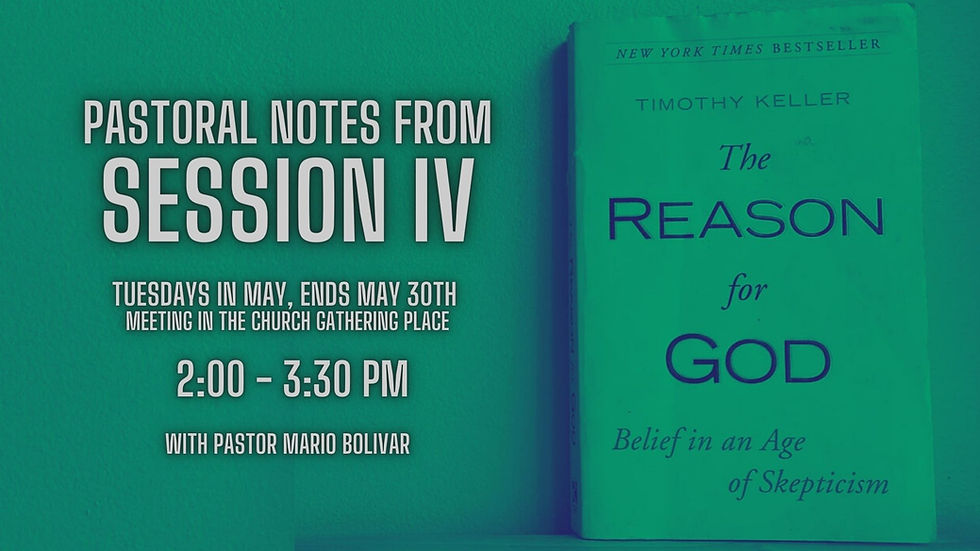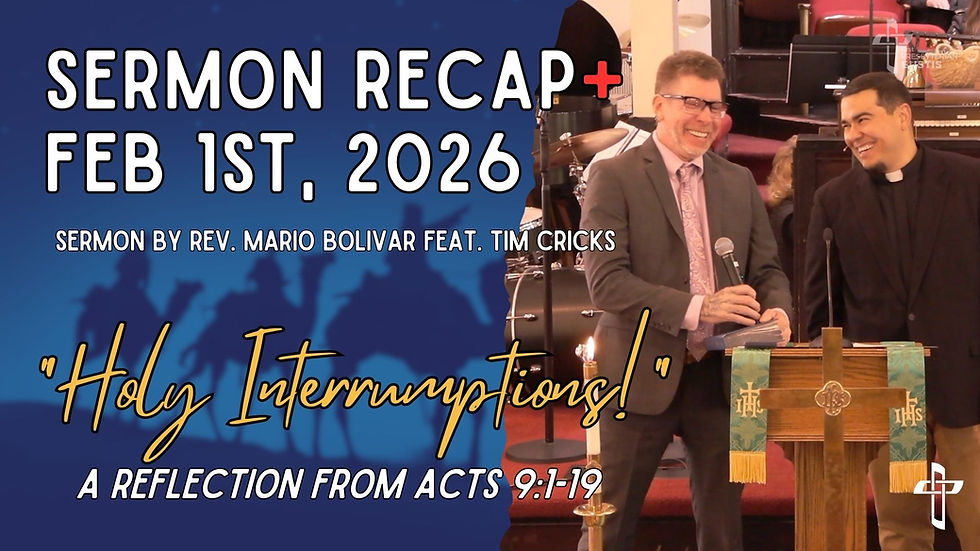The Reason For God Notes #4
- Mario Bolivar
- May 22, 2023
- 6 min read
On May 16th, we had Session Number Four of our study of "The Reason for God," one of the many works from Pastor Tim Keller. Once again, we were blessed with lively conversation and the opportunity to explore many ideas and address many questions and suggestions. Read below the questions and some of the elements that were part of our discussion.
Read below some notes about our gathering:
Intermission
Chapter VIII "The Clues of God"
Chapter IX "The Knowledge of God"
Chapter X "The Problem of Sin"
**** Important: at the end of this blog, you will find a document that will contain a selection of quotes and Scriptures that will help you go deeper on the subject.
In the intermission of "The Reason for God" by Tim Keller, the author addresses the doubts and objections surrounding Christianity, recognizing that they stem from alternate beliefs and unprovable assumptions about the nature of things. Keller's examination of the seven major objections to the Christian faith leads him to conclude that while he respects the reasoning behind them, he does not find them sufficient to render Christianity impossible or even improbable as a truth. He acknowledges that there is another journey to undertake, one that goes beyond arguing against disbelief and delves into presenting sufficient reasons for believing in Christianity.
Regarding rationality, Keller addresses the claim made by some Christians that those who reject their arguments for faith are simply closed-minded or stubborn. He acknowledges the existence of books calling Christians to provide proof but also introduces the viewpoint of Oxford philosopher Richard Swinburne. Swinburne argues that belief in God can be tested and justified, though not proven, in the same way. He contends that the view that there is a God aligns with our observations of the universe, scientific laws, human consciousness, and moral sense, while the theory of no God does not account for these phenomena. Thus, belief in God offers a better empirical fit and explanation for what we observe.
Keller concludes by clarifying that Christians should not claim to possess omniscience or absolute knowledge of reality, which belongs only to God. However, they believe that the Christian narrative of creation, fall, redemption, and restoration provides the world's most coherent and meaningful understanding. He invites readers to embrace Christianity as a perspective, akin to putting on spectacles and encourages them to examine the power it holds in explaining and making sense of what we know and see.
THE CLUES OF GOD - CHAPTER VIII
Here Tim Keller delves into the clues that point toward the existence of God, even though there cannot be irrefutable proof. Keller highlights how the intricate design and order in the universe suggest the presence of a divine Creator. He references the views of physicist Stephen Hawking, who acknowledges the improbability of a universe like ours emerging by chance and suggests religious implications.
Keller also explores the relationship between Christianity and science, noting that many scholars argue that modern science arose from a Christian worldview, which affirmed an all-powerful, personal God who created and sustained an orderly universe. The regularity of nature is presented as a clue for the existence of God, as it provides a coherent explanation for the consistent laws and patterns observed in the world.
Furthermore, Keller challenges the implications of a worldview devoid of God. Without God, purpose and meaning in life are reduced to accidents or neurochemical responses. Beauty, love, and other human experiences lose their significance and become mere products of evolution. Keller questions the notion that our capacity to believe in God is solely a result of evolutionary processes, arguing that if we can't trust our minds about anything, then skepticism should apply to both the concept of God and the field of evolutionary science itself. Anyhow, in light of the evidence and the rationality of the world, Keller contends that the view that God exists makes more sense and accounts for the observed phenomena better than the alternative view that denies God's existence. He likens these clues to pieces of a puzzle that point toward the reality of God. Ultimately, Keller suggests that seeking God with an open heart and mind is key to finding Him.
Throughout this chapter, Keller incorporates several biblical verses, including Genesis 1:1-31, Jeremiah 29:13, John 3:8, Hebrews 3:4, Isaiah 45:18, and Romans 2:14-15, which further emphasize the existence of God, the creation of the universe, the search for God with a sincere heart, and the inherent understanding of moral laws within individuals.
THE KNOWLEDGE of GOD, CHAPTER IX
Here Keller explores the issue of moral relativism and the absence of a visible basis for moral convictions in our culture. Contrary to conservative complaints about the younger generation being relativistic and amoral, Keller shares his experience as a pastor in Manhattan, where he finds that young people still possess solid moral convictions.
The chapter includes a conversation with a young couple who hold contradictory views about human rights and the uniqueness of human beings. The couple believes that trampling on someone's rights is wrong, even though they view humans as evolved animals. Keller challenges their double standard and questions the basis for their moral intuitions. The conversation reveals how moral convictions in contemporary culture lack a solid foundation and seem to be detached from any visible source.
Keller then examines various theories about the origin of human rights, including the belief that they come from God, from nature, or from societal agreements. He critiques these theories, pointing out the flaws in each one. For example, nature itself is characterized by violence and survival of the fittest, making it incompatible with the concept of individual dignity. The belief that human rights are created by societal consensus raises the question of what happens when a majority decides to ignore or violate those rights.
The chapter highlights the inconsistency of the belief that everyone has the right to find truth within themselves and that moral views should not be imposed on others. Keller challenges this perspective, pointing out that people often recognize certain actions as wrong and expect others to abide by a moral standard regardless of personal convictions.
Throughout the chapter, Keller references several Bible verses to support his arguments. These include Romans 13:8-10, Matthew 7:12, Mark 7:20-23, 1 Corinthians 6:9-11, and 1 Corinthians 15:33. These verses emphasize the importance of love, the fulfillment of the law through love, the nature of evil coming from within the heart, and the influence of company on moral behavior.
THE PROBLEM OF SIN, CHAPTER X
Keller examines the concept of sin and its significance in Christianity. Keller acknowledges that the term "sin" can be offensive or misunderstood by many. He shares an anecdote about a man at an Alcoholics Anonymous meeting who struggled to recognize his own faults and instead blamed others for his problems. Keller highlights the need to understand the Christian understanding of sin and its impact on humanity.
According to Keller, sin goes beyond simply breaking divine rules. He refers to the first commandment, "You shall have no other gods before me," which reveals that sin involves making good things into ultimate things, seeking to find one's identity, purpose, and happiness in anything other than a relationship with God. Building our lives on something besides God leads to emptiness and the illusion that success, wealth, popularity, or beauty can bring ultimate fulfillment, which is ultimately untrue.
The devastating consequences of sin are depicted in the story of Adam and Eve in Genesis 3. As humanity turned away from God, the entire world became broken and filled with decay, suffering, and futility. Disease, natural disasters, aging, and death are all results of sin's impact on the world. Paul, in Romans 8, states that the world is in bondage to decay and will only be restored when humanity is restored.
Keller emphasizes that Christianity is not just for those who have experienced failures in life but speaks to the deepest longings of every human soul. The human soul, created by God, cannot be truly satisfied by anything less than a relationship with Him. Jesus, as the Creator-Lord, offers the ultimate fulfillment, significance, security, and forgiveness. Living for anything other than Jesus becomes idolatry, and only Jesus can truly satisfy and forgive.
Throughout the chapter, Keller references several Bible verses, including James 4:17, Romans 6:23, Romans 3:23, 1 John 1:8-10, and Mark 7:20-23. These verses highlight the reality of sin, its consequences, the need for forgiveness, and the recognition that sin originates from within the human heart.
Quotes and Scriptures -- Download the Document Below





Comments